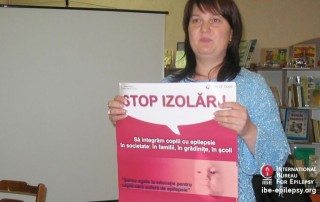New website for International Epilepsy Day is launched (International Epilepsy Day 2015)
www.epilepsy.org IBE and ILAE are delighted to announce that the new website for International Epilepsy Day is launched. Events are taking place around the world to mark the first International Epilepsy Day. Visit the site to see just some of the events and activities that are taking place on 9th February 2015 VISIT THE WEBSITE - CLICK HERE Social Media - How YOU can help! Social media will play a huge role worldwide in getting the epilepsy awareness message out to the public. On February 9th there will be a worldwide effort to get #epilepsyday to trend on twitter and other social media sites. We're looking for all social media users to post a photo on the day using a sheet of paper to display the hashtag and your location. If you don't use social media, you can send us your photos and we will post them for you! Be part of the worldwide social media effort. We need you to get active on social media! Change your cover photo and profile picture to the International Epilepsy Day logo available on the download page Please share content and promote International Epilepsy Day using the hashtag #epilepsyday Take a "selfie" in a famous location in your country with #epilepsyday card. [...]

